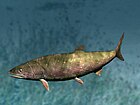Furo (fish)
| Furo | |
|---|---|
 | |
| Specimen of an indeterminate species of Furo | |
| Scientific classification | |
| Domain: | Eukaryota |
| Kingdom: | Animalia |
| Phylum: | Chordata |
| Class: | Actinopterygii |
| Clade: | Halecomorphi |
| Order: | †Ionoscopiformes |
| Family: | †Furidae |
| Genus: | †Furo Gistel, 1848 |
| Type species | |
| †Furo orthostomus Agassiz, 1845 vide Agassiz, 1833 | |
| Species | |
| †F. orthostomus (Agassiz, 1833-1845) | |
| Synonyms | |
| |
Furo is an extinct genus of ray-finned fish belonging to the order Ioniscopiformes that has been found in Europe. The type species is F. orthostomus.
Taxonomy
[edit]The type species of Furo, F. orthostomus, was originally named Eugnathus by the Swiss naturalist Louis Agassiz in 1843,[1] but the genus name was changed to Furo by Johannes von Nepomuk Franz Xaver Gistel in 1848 because Eugnathus was preoccupied by the beetle genus Eugnatha. A number of species referred to Furo have been found in the Solnhofen Formation of Bavaria.[2] The type species of Ophiopsis, O. muensteri, was mistakenly referred to Furo by some authors, but recent studies have indicated that the Furo and Ophiopsis type species are distantly related.[3][4]
References
[edit]- ^ Agassiz, L ., 1833 - 1843. Recherches sur les poissons fossiles. Band 1-5. Neuchatel
- ^ Lambers, P.H., 1998. The genus Furo (Pisces, Halecomorphi) from the Upper Jurassic Plattenkalke of Germany. Oryctos, 1, 23-35.
- ^ Lane, J. A. & Ebert, M., 2012: Revision of Furo muensteri (Halecomorphi, Ophiopsidae) from the Upper Jurassic of Western Europe, with comments on the genus. Journal of Vertebrate Paleontology, 32 (4): 799–819. doi: 10.1080/02724634.2012.680325
- ^ Lane, J. A. & Ebert, M., 2015: A taxonomic reassessment of Ophiopsis (Halecomorphi, Ionoscopiformes), with a revision of Upper Jurassic species from the Solnhofen Archipelago, and a new genus of Ophiopsidae. Journal of Vertebrate Paleontology, 35 (1): e883238. doi: 10.1080/02724634.2014.883238


 French
French Deutsch
Deutsch
